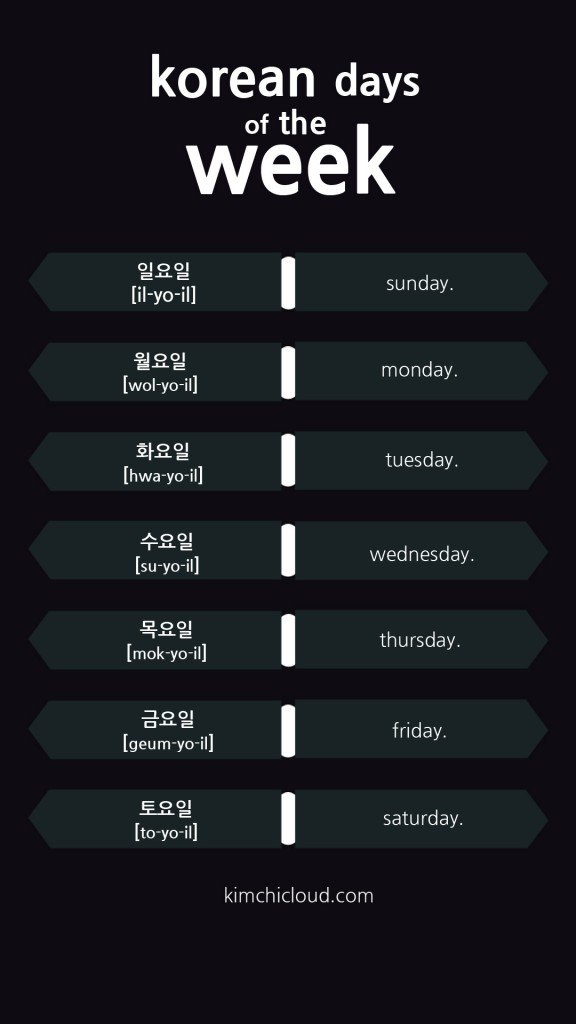-요일 – The Korean Days of the Week
Days of the Week in Korean
In this lesson we will introduce the seven words for the days of the week in Korean. While a similarities between the English language and Korean are scarce, at least you can find comfort in that there are, just like in English, only seven days in one week (phew!). No more, no less. So no cultural mind blowing going on here. On top of that, just like in English, where all words end with ‘-day,’ the days of the week in Korean also share a single common suffix – ‘yo-il’ (in Hangul: -요일).
So to make memorizing them easier, you would only have to memorize what comes before the ‘yo-il’ (요일) part. If you aim for fluency, however, I would recommend learning the entire words since you won’t be using these first syllables by themselves. Ultimately, your goal should not just be to memorize them, but also to learn and internalize them. With that said, it might still be useful to memorize the first syllables in case you forget which days is which. If so, you should memorize them like sequence “wol-hwa-su-mok-geum-to-il” (월화수목금토일). Try repeating the sequence out loud or quietly a few times a day and you will have it memorized in no time.
Check below for some examples on how to actually use these words for the days of the week in Korean.
| Korean | English |
|---|---|
| wol-yo-il (월요일) | Monday |
| hwa-yo-il (화요일) | Tuesday |
| su-yo-il (수요일) | Wednesday |
| mok-yo-il (목요일) | Thursday |
| geum-yo-il (금요일) | Friday |
| to-yo-il (토요일) | Saturday |
| il-yo-il(일요일) | Sunday |
Examples
토요일에 만났어요.
[toyoil-e mannasseoyo]
= We met on Saturday. (the particle ‘-e'(-에) marks the time)
화요일마다 김밥을 먹어요.
[hwayoil-mada kimbap-eul meokeoyo]
= I eat gimbap every Tuesday. ( ‘mada’ (마다) means ‘every’ )
This is all you need to know as a beginner, so if you just came here for the vocabulary, you can take a well-deserved break or go check out or other Everyday Korean Lessons, but in case you want to know more about these words and their history, make sure to keep on reading.
Chinese origin
Just like many, many other words in Korean, the days of the week, too, have their roots in the Chinese language. The meanings are all related to, and named after, the five elements of nature (in Chinese culture) + the moon and the sun. Japanese uses these same Chinese characters, Hanja (or Kanji in Japanese), so if you already know Japanese, you will probably already have found that the words are very similar to each other. There is only one syllable that comes before the suffix (‘-yo-il / 요일) as explained above so learning them is not that hard.
| Hanja/Korean/Romanized | Meaning |
|---|---|
| 月 – 월 – wol | moon |
| 火 – 화 – hwa | fire |
| 水 – 수 – su | water |
| 木 – 목 – mok | wood / tree |
| 金 – 금 – keum | gold |
| 土 – 토 – to | earth |
| 日 – 일 – il | sun / day |
Note that these words/syllables are not really used on their own in Korean. For example, if you just want to say ‘sun’ you would say ‘tae-yang’ (in Hangul: 태양) , which is the pure Korean word for ‘sun,’ and not ‘il’ (일), which is the Sino-Korean (meaning Chinese-Korean) word.
For more vocabulary, you might find our article ‘101 Most Useful Korean Words and Phrases‘ useful.
Please like or share if you found this lesson useful. If you have any questions or something else on your mind, whatever it is – make sure to let us know by leaving a comment below and we will do our best to help you out!
By: Kimchi Cloud






Very useful for someone who wants to learn Korean. Thank you so much for spending time in making such useful website for those beginner like me. Very easy to understand and memorize and learn.
Thank you once again 🙂 Keep up the great work.
Thank you so much for the kind words! Glad to be of help. ^^
Keep on learning!
Thanks kimchicloud.com for helping me. Learning everything.